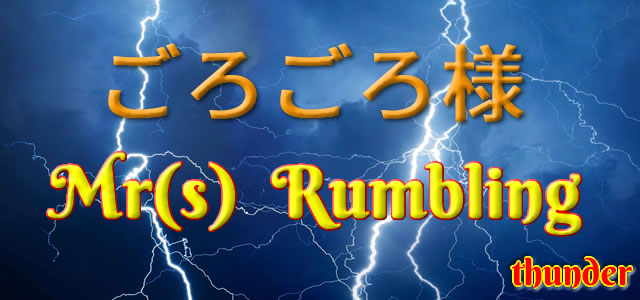
Here’s a recording in a mystery language.
Do you know, or can you guess, the language?
The words rifle and ruffle sound similar, but are they related? Let’s find out.
A rifle is a firearm fired from the shoulder with a long, rifled barrel, which increases range and improves accuracy. It is short for “rifled gun”, referring to the spiral grooves inside the barrel (rifling).
It comes from Middle English riflen (to rob, plunder, search through), from Old French rifler (to lightly scratch, scrape off, plunder), from Proto-Germanic *rīfaną (to tear, rend), from Proto-Indo-European *h₁reyp- (to tear) [source].
A ruffle is any gathered or curled strip of fabric added as trim or decoration; or a disturbance, agitation or commotion.
It comes from Middle English ruffelen, perhaps from Old Norse hrufla (to graze, scratch), or Middle Low German ruffelen (to wrinkle, curl). Beyond that, the etymology is not certain [source].
So it seems that rifle and ruffle are not related.
Words that do come from the same roots as rifle include rift, rip and rope in English; rive (bank [of a river]) in French, and arriba (above, over, up) in Spanish [source].
Words that do come from the same roots as ruffle include ruff in English, and hrufla (to graze, scratch) in Icelandic [source].
The English word riffle (a swift, shallow part of a stream causing broken water; a succession of small waves; a quick skim through the pages of a book; to ruffle with a rippling action, etc) is possibly an alteration of ruffle [source].

Here’s a recording in two mystery languages – we didn’t have a language quiz last week because I was away on holiday in Scotland and didn’t have time to set it up, so we have a bonus language this week.
Do you know, or can you guess, the languages? They are related, by the way.

A sunny morning in Oban / Madainn ghrianach anns an Oban
The trip from Oban to Skye went smoothly, and I bumped into a couple on the bus who I met at SMO last year. There were several other SMO-bound people on the bus, but I didn’t know them at the time. We arrived safely at Broadford on Sunday afternoon, and got a lift to the college from there. Along the way, there was sunshine, lots of rain and some high winds, and the views from the bus were beautiful.

Changing buses in Tyndrum / Ag atharrachadh bhusaichean ann an Taigh an Droma
So far, the Gaelic song course has been a lot of fun. There are eleven of us in the class from Scotland, England, Ireland, Switzerland and Germany. Some are here for the first time, others have been here before. Most speak at least some Gaelic, and there’s one native speaker. For me, it’s my 10th time here doing Gaelic song courses, and the 7th course I’ve done with Christine Primrose – the other song courses were with Joy Dunlop, Margaret Stewart and Mary Ann Kennedy.

Àrainn Chaluim Chille – the newer part of the college / Am pàirt as ùire den cholaiste
We learnt five songs on Monday, eleven yesterday, and another four today. Some of them I already know, or have at least heard before, which makes it easier to pick them up. Others are a bit more challenging with lots of verses, and complex melodies that change with every verse to fit to the words. Everything is taught by ear, and Christine likes to tell stories about the songs, the people who wrote them, and how life was at the time they were written. A lot of the songs are relatively old – from the 17th or 18th centuries, and have been passed on orally since then.

Àrainn Ostaig – the older part of the college / am pàirt as sine den cholaiste
On Monday night there was a pub quiz, which was good fun. The team I was in didn’t win, but we were only one point behind the winning team.
The people who study here and work here come from many different places and speak a variety of languages. I try to speak as much Scottish Gaelic as I can while I’m here – that’s one of the reasons why I come here – and I’ve also had conversations in French, Irish and Mandarin Chinese, and spoken odd bits of Welsh, German, Portuguese, Japanese, and even a bit of English.

The views from here are quite nice / Tha na seallaidhean às an seo gu math snog
Last night there was a concert featuring Eilidh Shaw and Ross Martin, a husband and wife duo – he plays the guitar, and she sings and plays the fiddle. They write interesting songs and lively tunes in a traditional Scottish style and sounded great. It was also a nice way to celebrate my birthday.
We have a bit of time off today, and there’s a music session in the bar tonight. I was planning to go for a walk, but it’s raining quite a lot, so I’m spending my free afternoon relaxing in my room, learning a bit more Gaelic, writing nonsense like this, and reading.
Well, I finally arrived in Oban about an hour ago. It’s dark, it’s raining, and I’m about 3.5 hours late. I was hoping to see a bit of the town while it was still light, but at least I made it here. My trip from Bangor to Glasgow went smoothly, with most of the trains being on time and not too crowded. Things went a bit off the rails after that.

The view from my hotel room on Sunday morning
When I arrived at Glasgow Queen Street station, I discovered that the train I was supposed to take to Oban was cancelled. Fortunately there was another, although I had to wait 2 hours, and it was late arriving in Glasgow, so more like 2.5 hours. It was a nice sunny day, though a bit windy, so I had a wander, sat in a café for a bit, did some work, and then we were off.
While I was waiting, I heard that the ferry from Mallaig to Armadale on Skye that I was planning to take tomorrow will not be sailing due to bad weather. So I had to find an alternative route. Fortunately there is a bus from Oban to Broadford on Skye (two buses, actually), and I’ve arranged a lift from there. If everything works out, I should be at Sabhal Mòr Ostaig by tomorrow afternoon.

Tyndrum / Taigh an Droma, where I changed buses
I’ve applied for compensation for my cancelled train from Glasgow to Oban, so might get some money back from that.
While I have a driving licence and could have rented a car (I don’t own one and never have), I prefer to travel by train, even though there are often delays, cancellations and other shenanigans.
One thing I like about travelling by train, or other public transport, is that you often overhear conversations in a variety of languages. Today, for example, I heard conversations in English, Welsh, Thai, French, Cantonese, Mandarin and German. There may have been other languages that I didn’t recognise as well.
Today I discovered that one way to say thunder in Japanese is ごろごろ様 (gorogoro sama) or literally “Mr(s) Rumbling”.

ごろごろ / ゴロゴロ (gorogoro) is one of the many Japanese onomatopoeic / mimetic words that means rumbling (of thunder, one’s stomach, etc), grumbling, growling, purring, rolling (of sth large and heavy), tumbling, all over the place, everywhere, commonly, in great numbers, idly, lazily, slothfully, or the uncomfortable feeling of have a foreign substance in one’s eye, stomach, etc. [source].
Some examples of how it’s used include:
Other words for thunder in Japanese include:
By the way, I’m going to Scotland tomorrow for a week of learning Scottish Gaelic songs at Sabhal Mòr Ostaig, the Gaelic college on the Isle of Skye. Looking forward to it. During this time, there’ll be few, if any, up-dates to this site, blog posts or podcasts, and I probably won’t have time to answer all your emails. Things will be back to normal after I get back.
I have some news – I’ve had enough of learning languages and am giving up, throwing in the towel, putting the fiddle in the roof, throwing a spoon, and throwing the axe in the lake.

This is something I’ve been thinking about for a while. I like speaking other languages, at least sometimes, but the process of learning them can be a bit tedious. I already speak some languages reasonably well and don’t currently need to learn any more, so maybe my time would be better spent doing other things.
My other main passion is music – I like to sing, to play instruments, and to write songs and tunes. I’ll be spending more time doing this, and will maybe even focus on one instrument, at least for a while, and learn to play it better.
The question is, which instrument? I have a house full of them, including a piano, harps, guitars, ukuleles, recorders, whistles, ocarinas, harmonicas, melodicas, a mandolin, a bodhrán and a cavaquinho.
The instrument I play most often at the moment is the mandolin, so maybe I should focus on that.
If you’ve noticed the date, you may realise that this post is in fact an April Fool. I’m not giving up on learning languages, and actually do enjoy the process, most of the time, and while I do want to improve my mandolin playing, I also want to improve my playing of other instruments.
Incidentally, let’s look at some ways to say that you’re giving up.
In English you might say you quit, you’re calling it a day, you’re calling it quits you’re throwing in the towel or the sponge or the cards, or you’re throwing up your hands.
Equivalent phrases in other languages include:
More details of these phrases can be found on Wiktionary.
Do you have any others?
Are you a madrugador?
I used to be, but now I’m more of a dormilón and a trasnochador.
Madrugador [ma.ð̞ɾu.ɣ̞aˈð̞oɾ] is a Spanish (and Portuguese) word that means an early riser, early bird or morning person, and as an adjective it means rising or waking early. [source].
Madrugador comes from madrugar (to get up early), from Vulgar Latin *mātūricāre (to wake up early), from Latin matūro (to ripen, mature, hasten, rush), from mātūrus (mature, ripe, early, soon), from Proto-Italic *mātus (ripeness) from the PIE *meh₂- (to ripen, to mature) [source].
Sometimes you can pack a lot of meaning into one word in Spanish, for example, madrugaba (I/he/she/it used to get up early) and madrugadores madrugaban (early risers used to rise early).
Related words include madrugada (dawn, early hours of the morning, before dawn) and madrugón (early riser, early bird, early start).
Words with similar meanings include tempranero (early, early-rising, early riser) [source] and mañanero (early rising, morning, early riser) [source].
How would you say early riser in other languages?
By the way, there’s a novel by Jasper Fforde called Early Riser that I would recommend.
If you’re a late riser, like me, then you’re a dormilón, which should not be confused with dormilona (reclining chair, nightgown), and if you stay up late, you could be described as a trasnochador (night owl, night bird) or a noctámbulo (active at night, sleepwalker, night owl) [source].
Are there interesting equivalents of late riser or night owl in other languages?
The English words mature and maturate (to ripen, bring to ripeness or maturity) come from the same Latin roots [source].
Apparently a quien madruga, Dios le ayuda (“God helps those who rise early”) or in other words the early bird gets the worm [source].
How would you say that in other languages?
Alternatively, you could say no por mucho madrugar, amanece más temprano (“getting up earlier won’t make the sun rise sooner”) or in other words things will happen at their own time, you can’t rush art [source].